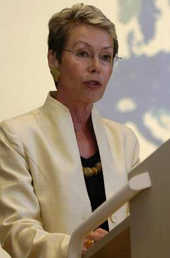EU investigators arrive in Tbilisi
By Temuri Kiguradze
Tuesday, February 10

The mission held a meeting with Georgian Foreign Minister Grigol Vashadze and his deputies Giorgi Bokeria and Alexander Nalbandov. Speaking to The Messenger Nalbnadov stated that the activity of the EU mission is “extremely important” for Georgia and for the international community. “The mission will allow the international community to discover the truth about the August war and find out what led to the start of the conflict. Georgia is ready to provide the EU delegation with any documents referring to the war and make it possible to meet and speak with any official involved in this issue,” said the Deputy Foreign Minster
After this meeting the EU investigators met Georgian Minister on Reintegration Issues Temur Iakobashvili. The delegation will also meet several other officials, representatives of Georgian opposition parties and independent experts. “It’s important that cooperation with the Georgian Government has already begun and that this cooperation is taking place at expert level. [Georgian] military and historical experts will be involved in this process,” stated the head of the mission Heidi Tagliavini when speaking to the Georgian journalists on February 9.
The delegation also plans to meet both the Parliamentary and non-Parliamentary opposition. “Of course our party will be among the other parties to meet with Ms.Tagliavini. We are going to provide her with all the genuine information on the August war we posses. If the results of the inquiry show that the Government of the country and President Mikheil Saakashvili were guilty of dragging the country into this deadly provocation, that will not mean that the country itself is guilty of that,” stated Manana Nachkebia, from the opposition New Rights Party.
The inquiry mission was created in late 2008, its work being sponsored by the EU. It was welcomed by all sides in the August conflict and by international organisations. Its final report is supposed be prepared by July 31 2009, but the mission has the power to extend this deadline according to its needs.
“Georgia should prove to the Commission that we were right during the August war,” considers Soso Tsintsadze, a Georgian political analyst. “The Commission will acquire information from different sources, including Russian officials and separatist representatives. The Georgian Government should call on its most experienced diplomats to provide the information which will prove that Georgia was innocent in August and has every right to defend its population when they are bombed by the separatist authorities,” he continued. The analyst considers that if Georgia fails to defend itself adequately during the EU investigation this “may cause a chain reaction in the international community and the country may lose the support of the West.”
Before coming to Tbilisi the EU delegation paid a visit to Moscow and talked to Russian MPs “I think that the mood is very constructive; there are no foregone conclusions; there was a readiness to accept the Russian side’s arguments,” MP Konstantin Kosachev, the Chairman of the Russian State Duma’s Foreign Affairs Committee, said after the meeting. “I think our position has been heard, and most importantly it seemed to me that the mission will not only focus on fact finding, but also on setting out recommendations.”
“Today it is important to gather facts and documentary evidence,” MP Sergei Markov said after the meeting. “Of course, Russia is cooperating [with the mission], we are holding meetings… I think that the Ossetians and Abkhazians will also cooperate with them upon our request.” Heidi Tagliavini announced that the delegation is going to visit Tskhinvali, the capital of the Georgian breakaway region of South Ossetia after the meetings in Tbilisi.
The visit of the Commission coincides with a new escalation of tension in the conflict regions. On February 9 the South Ossetian de facto authorities announced that thee had been an “attack on Tskhinvali from Georgian territory.” According to the de facto South Ossetian authoritiy’s official Press Committee, the “kindergarten in Tskhinvali was attacked from the territory of the Georgian village on Nikozi.” The Committee states that the “attackers” used Soviet-type grenade launchers. The day before theGeorgian Ministry of Internal Affairs had announced that a Georgian citizen had been kidnapped by a “gang of South Ossetian separatists.” The Tskhinvali de facto authorities confirmed this information, and stated that the kidnapped man had been liberated during a special operation against the criminals and had already been returned to Tbilisi.
